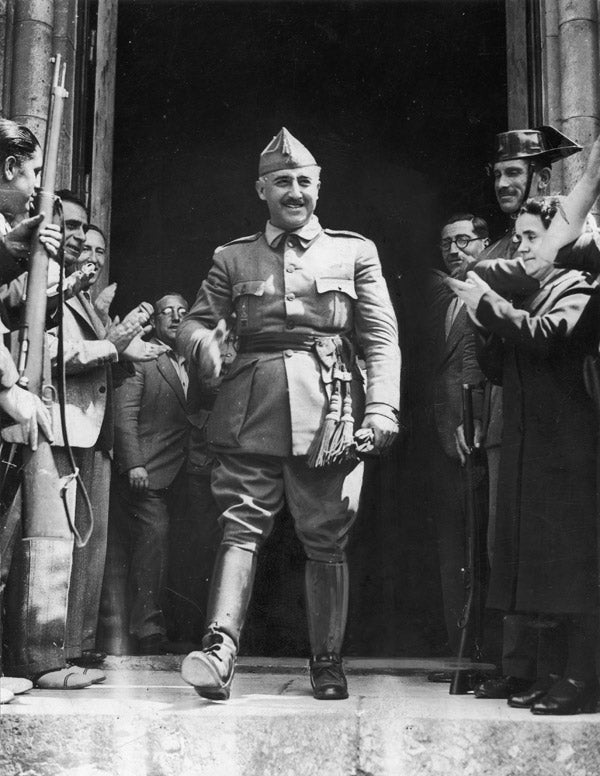Papa Spy, By Jimmy Burns
Adventures of a man of mystery in Madrid

Your support helps us to tell the story
From reproductive rights to climate change to Big Tech, The Independent is on the ground when the story is developing. Whether it's investigating the financials of Elon Musk's pro-Trump PAC or producing our latest documentary, 'The A Word', which shines a light on the American women fighting for reproductive rights, we know how important it is to parse out the facts from the messaging.
At such a critical moment in US history, we need reporters on the ground. Your donation allows us to keep sending journalists to speak to both sides of the story.
The Independent is trusted by Americans across the entire political spectrum. And unlike many other quality news outlets, we choose not to lock Americans out of our reporting and analysis with paywalls. We believe quality journalism should be available to everyone, paid for by those who can afford it.
Your support makes all the difference.Jimmy Burns certainly never regarded his dad, Tom, as ordinary. He was after all a successful, high-profile publisher, latterly editing the Catholic magazine, The Tablet, counted Evelyn Waugh and Graham Greene as good friends, and hung the walls of the family's central London home with pictures by another chum, the Welsh artist David Jones. But Burns Junior didn't quite grasp in his father's lifetime how much about a remarkable past had been left unsaid. Papa Spy is his account of finding out.
My first job, in the 1980s, was at The Tablet in the twilight of Burns's reign. I recall mutterings about him having once been in MI6. It made the kindly, cultured and urbane Burns seem even more glamorous.
However, he never said a word about it and his 1993 memoir, The Use of Memory, published two years before his death, gave little away. There the story might have ended had not his journalist son, while sorting out family papers, come across enough clues to make him want to know more.
Most parents keep details of their past from their children – former lovers, youthful follies or worse. What makes Tom Burns's secrets fascinating is that they touch directly on the conduct, and arguably the outcome, of the Second World War.
Part-Chilean, he was a Hispanophile who in 1940 was sent to Madrid officially as press attaché to the newly appointed British Ambassador, Sir Samuel Hoare, a former senior Cabinet minister disliked by Churchill, who described him as being descended from a line of maiden aunts. Hoare's task, though, was formidable and crucial: to keep Franco's Spain neutral in the conflict. If the dictator had followed his own fascist inclinations, he would have sided with Hitler and Mussolini, as indeed they were pressurising him to do so as to get their hands on his ports and block Allied access to the Mediterranean by overrunning the British enclave at Gibraltar.
Franco had to be wooed, but few had any appetite for the task. The military dictator's victory in the Spanish Civil War distressed many in Britain, across the political spectrum, who had sided against him and with the elected Republican government.
Burns, though, was part of that minority who had backed Franco, valuing the staunch support the General provided for the Catholic Church. Such a background made him a particularly effective if unconventional undercover worker in Madrid, forever one step ahead of the Gestapo.
But it also caused no end of suspicion about him back at base, where traditionalists saw him as a loose canon and virtually a foreigner, while left-wing elements in the secret services, notably Kim Philby and Anthony Blunt, both later unmasked as Soviet agents, did their best to discredit Burns as a closet fascist. This is a great story, with drama, betrayal and historical significance. Jimmy Burns has painstakingly pieced it together with great precision and admirable detachment. For alongside the political intrigue and the espionage work, he found a more intimate tale.
When he left for Madrid, Burns was in the midst of a great love affair with the poet Ann Bowes-Lyon, cousin of the then Queen Consort, later Queen Mother. It was only when researching the book that Burns learned of it. The romance ended because Tom Burns's Catholicism and non-Establishment background put him beyond the pale for a scion of a family related by marriage to the monarch.
Such an outcome gives a snapshot of prejudices in the 1940s – and of how far we have travelled. It also provides Jimmy Burns with a happy ending. In Madrid, Burns the spy met Mabel Maranon, the daughter of one of his Spanish contacts, and the woman who was to become his wife and mother of his children.
Peter Stanford's 'The Extra Mile: the 21st-century pilgrim' is published next year by Continuum
Join our commenting forum
Join thought-provoking conversations, follow other Independent readers and see their replies
Comments